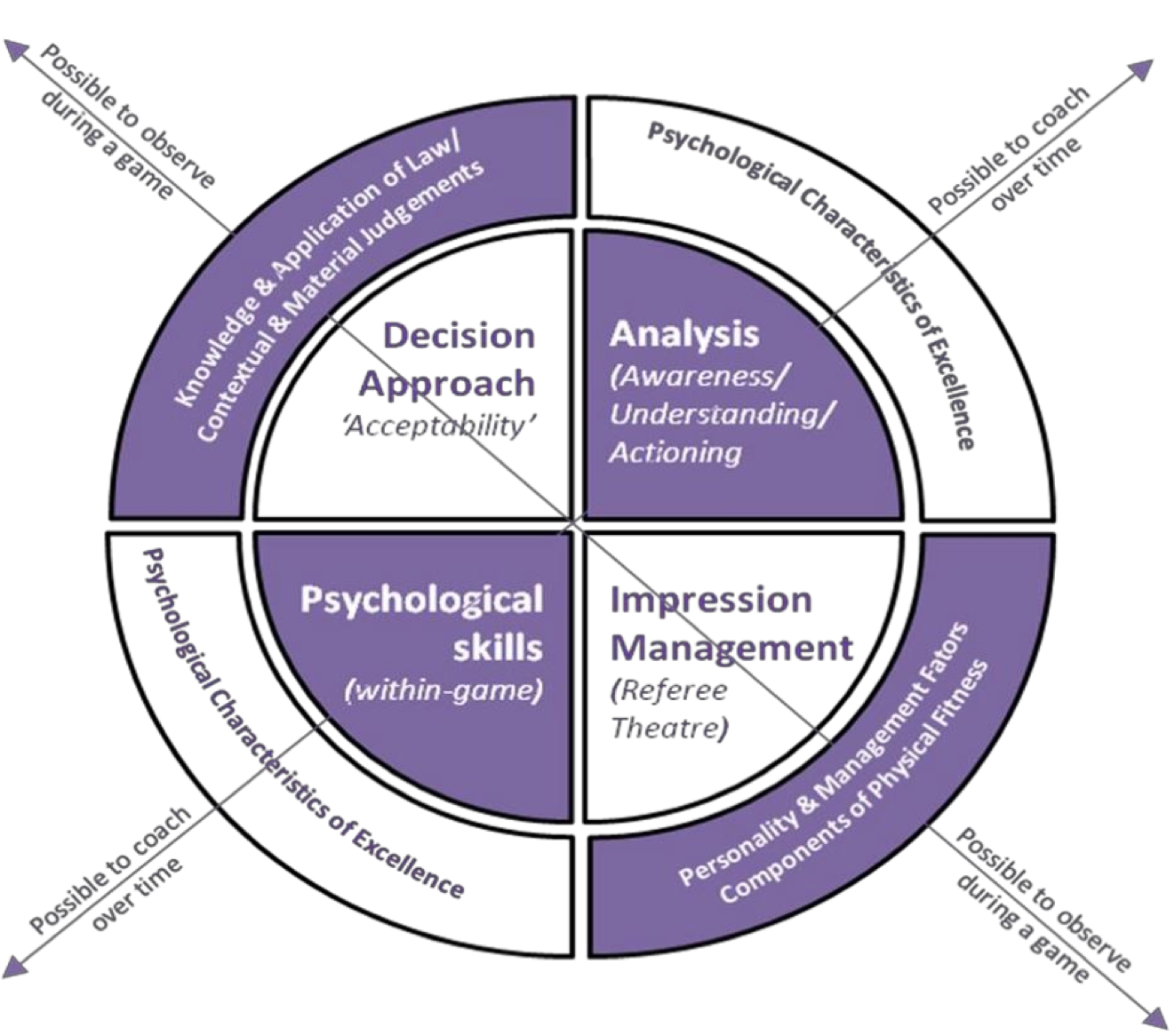A refereeing performance model for training talent
Submitting Institution
Glyndŵr UniversityUnit of Assessment
Psychology, Psychiatry and NeuroscienceSummary Impact Type
SocietalResearch Subject Area(s)
Psychology and Cognitive Sciences: Psychology, Cognitive Sciences
Summary of the impact
Recent research through the Applied Psychology Research Centre into
sports officiating at Glyndŵr University has helped to create a national
level referee performance model that is being used to identify and train
emerging talent. The model is currently being used with the Rugby Football
Union (RFU) English national panel of referee coaches.
Underpinning research
Previous research into the psychological and performance demands of rugby
union refereeing identified four cornerstones to the performance demands
of refereeing as (i) knowledge and application of the law (ii) contextual
and material judgment, (iii) personality and game management, and (iv)
physical fitness factors. Until now, this was the performance model
adopted by the RFU in England to develop elite refereeing expertise.
Further research has been based on interviews conducted in 2011 with
international rugby union referees (reference 3), and a study of
training international netball (reference 4) and hockey teams (reference
2) that built on empirically tested decision making principles (references
1, 5) to look at models to develop decision making skills through
reflection and intra/interpersonal analysis).
Following analysis of the interviews with international rugby union
referees regarding their decision making and decision communication, four
key themes were identified: corporate theatre, self-analysis, decision
approach/philosophy and within-game psychological skills. These have now
been merged with the previous four cornerstones model to form a unified
model (Fig.1).
 Fig. 1
Fig. 1
The original and unique aspects of this model are the areas of Referee
Theatre, recognising the need to communicate effectively to a range
of audiences (such as the players, coaches, the crowd, spectators and
television commentators). In addition the research identified the
importance of Analysis skills, by conducting pre-game simulations
(visual imagery), template building (shared mental models) and decision
reviewing (self-reflection) in order to develop expertise.
References to the research
These are available on request if required and not in the public domain.
1. Mascarenhas, D. R. D., Button, C., O'Hare, D., & Dicks, M. (2009).
Physical performance and decision making in association football referees:
A naturalistic study. The Open Sports Sciences Journal, Paper 2, 9pp.
DOI: 10.2174/1875399X00902010001
2. Richards, P., Mascarenhas, D. R. D., & Collins, D. (2009).
Implementing reflective practice approaches with elite team athletes:
Parameters of success. Reflective Practice: International and
Multidisciplinary Perspectives, Vol.10, No.3, pp.353-363. DOI:
10.1080/14623940903034721
3. Cunningham, I., Mellick, M., Mascarenhas D.R.D., & Fleming, S.
(2012). Decision making and decision communication in elite rugby union
referees, Sport & Exercise Psychology Review, 18(2), 19-30.
4. Richards, P., Collins, D., & Mascarenhas D.R.D. (2012). Developing
rapid high-pressure team decision making skills. The integration of slow
deliberate reflective learning within the competitive performance
environment: A case study of elite netball, Journal of Reflective
Practice, Vol. 13, No.3, pp. 407-424. DOI:
10.1080/14623943.2012.670111
5. Mascarenhas, D. R. D., & Smith, N. C. (2012). Developing the
performance brain: Decision making under pressure. In: D. Collins, H.
Richards, & C. Button, Performance Psychology — Developing a Peak
Performance Culture. Elsevier, pp. 245-267.
Dr Duncan Mascarenhas, Senior Lecturer (2006 - present)
Pamela Richards, Senior Lecturer (2009 - present)
Ian Cunningham, MRes student (2010/11)
Details of the impact
The research results were presented at the RFU National Conference in
Warwick, May 2012. This paper allowed the RFU to not only have clear areas
for referee development but also to gain a better appreciation of expert
performance in each of the components. Feedback from this conference,
attended by the RFU national panel referees/coaches and assessors, enabled
further development of the model by the RFU's North West Referee
Development Manager.
The model has subsequently been implemented with the cohort of `National
Panel' referee coaches (15 - 20 individuals, who each work with national
panel referees over 1 or 2 seasons). The initial findings from the
implementation are that:
- For coaches, the model provides verification of their work, in terms
of content and delivery, and provides a basis for documenting their
work.
- For referees in training, the model increases their confidence through
the model's reference to its foundation in research with `elite'
referees.
- For the RFU, the model is serving as the basis for a curriculum for
referee coaching. In particular, the model emphasises the importance of
paying attention to `off-the-field' issues associated with refereeing
(e.g. psychological issues) as being just as significant for refereeing
as `in-the-game' issues.
In addition, the research into reflective practice and how to develop
on-field skills in the classroom has been used to inform the RFU's
approach as it currently works through the challenges of training mentors
and coaches to elite level to ensure a consistent approach.
The model provides a basis for further developments in referee coaching.
Researchers will be in consultation with RFU referees in January 2014 in
order to further develop the implementation of the model and discuss
on-going research into psychological skills for referees.
Sources to corroborate the impact
RFU North West Referee Development Manager